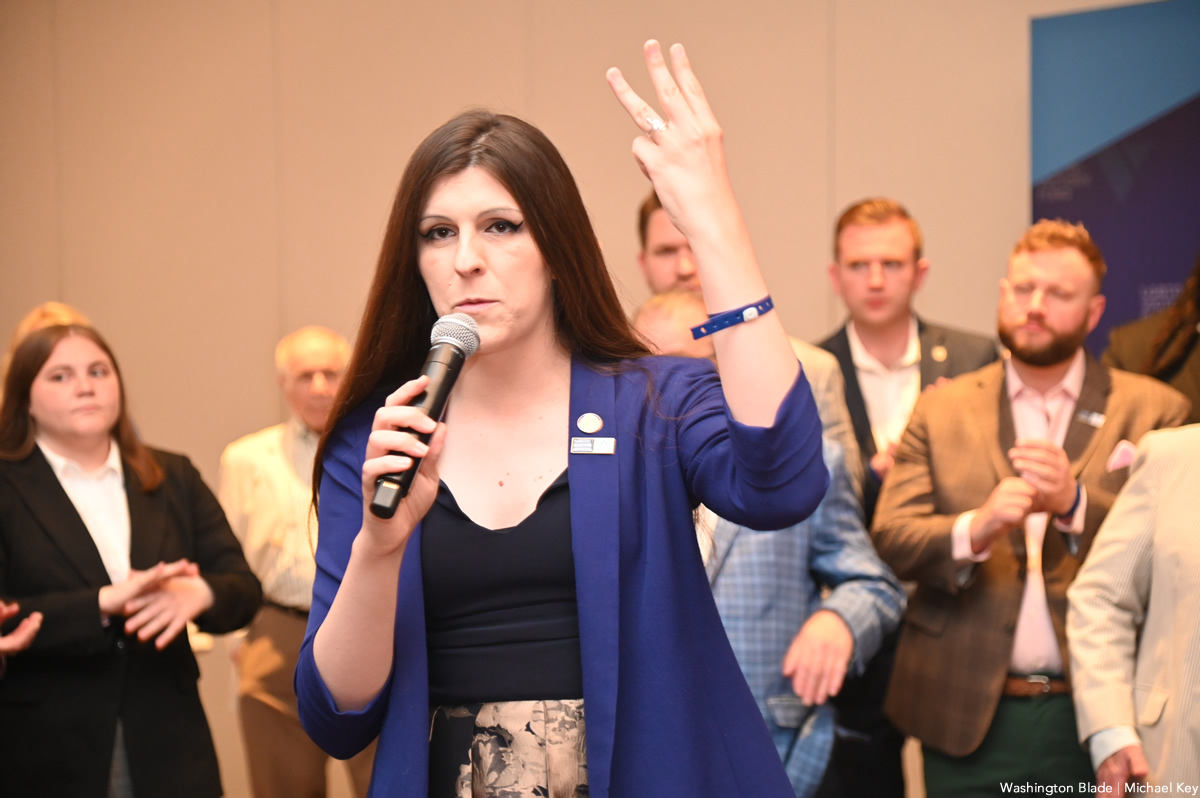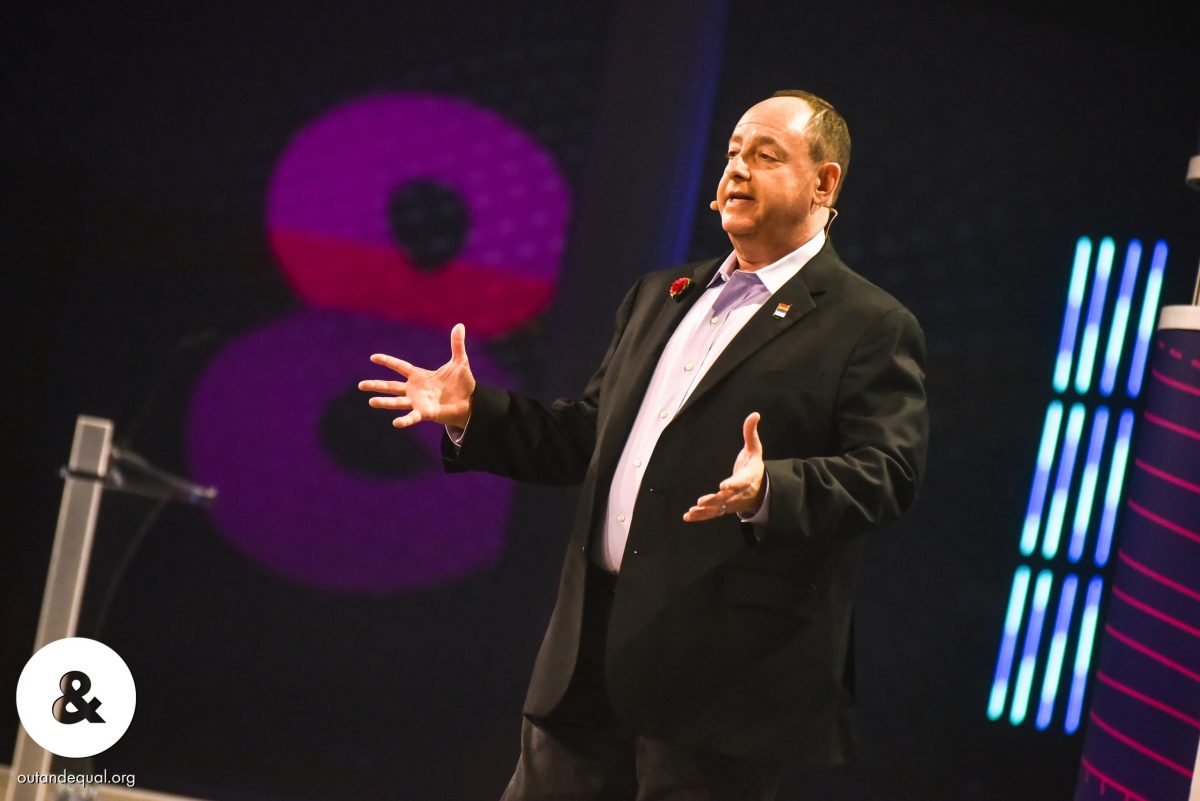Miscellaneous
How Obamacare repeal would hurt LGBT people
Trans, HIV/AIDS patients at risk if ACA goes down


President-elect Donald Trump (left), U.S. House of Representatives Speaker Paul Ryan (R-Wis.) and U.S. Senate Majority Leader Mitch McConnell (R-Ky.) have made Obamacare repeal a campaign promise. (Washington Blade file photos by Michael Key)
Amid persistent fears that a Donald Trump administration would roll back LGBT advances seen under President Obama, the protections that are most likely in jeopardy can be found in Obamacare.
A top campaign promise of President-elect Trump and Republicans in Congress — who will have unified control of the federal government — is to “repeal and replace” the Affordable Care Act. One provision in the law ensures that transgender people have access to transition-related care; another ensures that low-income people with HIV/AIDS can obtain life-saving medication.
Section 1557 of Obamacare prohibits health care providers and insurers from discriminating on the basis of gender. The Obama administration has issued a rule interpreting that provision to bar discrimination in health care against gender non-conforming and transgender people, including for the purposes of transition-related care and gender reassignment surgery.
Mara Keisling, executive director of the National Center for Transgender Equality, said she doesn’t think “anybody knows anything right now” about what the Republicans will do, but acknowledged it will be hard for them to ignore Obamacare.
“So we know the Affordable Care Act is going to be assaulted somehow,” Keisling said. “We don’t know if Section 1557 is, and it would just be a real shame if it was. It just basically says health care providers can’t discriminate on the basis of race, age, disability and sex.”
In the event Congress were to repeal Section 1557, Keisling said a “belt-and-suspenders” system remains in place that would help protect transgender people, including state insurance commission rulings, professional association rules and state non-discrimination laws under which health care or public accommodations is listed.
But Keisling also said Congress could render Section 1557 moot not just by repealing it, but refusing to fund the Department & Health Human Services and the Office of Civil Rights at a level that could enforce it.
“If they decide to starve civil rights enforcement processes and functions in the federal government like the Bush administration did, that hurts us,” Keisling said.
Laura Durso, senior director of LGBT research and communications at the Center for American Progress, said repeal of Section 1557 would have “devastating consequences” for many communities, but in particular transgender people, whom she said would “lose vital protections.”
“Without these civil rights protections, we could to go back to a time when science and compassion take a back seat to misinformation and ideology, and we must demand better for our transgender siblings,” Durso said.
Durso said prior to the Affordable Care Act, transgender people “overwhelmingly reported negative experiences with the health insurance market due to denials of coverage,” but after Obamacare — in part because of Section 1557 — the rate of insurance for low- and middle-income transgender people dropped from 59 percent in 2013 to 35 percent in 2014.
Undoing Medicaid could hurt people with HIV/AIDS
Obamacare also expanded Medicaid to cover individuals with incomes at less than 133 percent of the poverty level. After the U.S. Supreme Court in 2012 upheld the individual mandate in the Affordable Care Act, states could elect whether or not to take part in the expansion. Thirty-one states and D.C. elected to expand Medicaid.
According to an October report from the Kaiser Foundation, Medicaid is estimated to cover more than 40 percent of people with HIV in care. Additionally, Medicaid accounts for 30 percent of all federal spending on HIV care, and when combined with the states’ share of spending, is the second largest source of public financing for HIV care in the United States, the report says.
Carl Schmid, deputy executive director of the AIDS Institute, said many people with HIV/AIDS depend on Medicaid — both for drug and doctor care — because “a lot of people with HIV are very poor,” raising fears about how Trump might undo efforts to address the epidemic.
“We’re obviously very concerned about how he’s going to address HIV/AIDS issues — both domestically and globally — and then the Affordable Care Act is just so important for people living with HIV or at risk of HIV, and I don’t think they know the magnitude,” Schmid said. “And I think, hopefully, cooler, smarter heads will prevail as you get into the details.”
Schmid said the Affordable Care Act also is effective in addressing the HIV/AIDS epidemic because it covers preventive care, including HIV testing, with no patient cost-sharing.
One idea Republicans have proposed is changing Medicaid to a block-grant system in which the federal government would discontinue its open-ended commitment to help states cover costs in exchange for certain commitments and, instead, provide states with annual lump sums, freeing them up to run the program as they wish.
But Schmid said that would be bad for people with HIV/AIDS because some states, he said, want to eliminate the single tablet regime in favor of less costly individual components, which would require people with the disease to take more tablets per day.
“We’re concerned about the block-granting because we’re going to lose those protections they have in place at the federal level,” Schmid said.
In the event Congress rolled back Medicaid, Schmid said there would be more pressure on the Ryan White Care Act, which before Obamacare covered low-income people with HIV/AIDS, as “the payer of last resort.”
“Under the ACA and Medicaid expansion, Ryan White clients have been able to gain coverage under Medicaid for health care and medications, and Ryan White has been able to provide additional support services, like case management, transportation and food,” Schmid said. “If Medicaid was reduced, those clients would have to go back to reliance on the Ryan White Program.”
Both Section 1557 and the Medicaid expansion could be particularly vulnerable in the 115th Congress. A Senate Democratic leadership aide said both components of Obamacare can be undone through the reconciliation process, which would mean only 51 votes — not 60 — would be needed invoke cloture to move forward with repeal of the provisions.
Keisling, however, said her read of Section 1557 is that it would require 60 votes to undo, which likely means Congress would only get rid of it by repealing Obamacare in its entirety.
“I think if Section 1557 goes, the whole thing goes,” Keisling said. “It’s not the funding part of the bill, it’s just about how as we have this system that we’re trying to make better, it shouldn’t be a discriminatory system.”
Will Republicans follow through on repeal?
With an estimated 20 million people enrolled in health insurance plans as a result of Obamacare and that number growing during the open enrollment, it remains to be seen whether Trump and Republicans will make good on their promise to undo the law.
U.S. House Speaker Paul Ryan (R-Wis.) was cagey during a news conference on Thursday when asked about plans to repeal Obamacare during the 115th Congress.
“It’s a great question,” Ryan said. “That’s one that we’re going to be dealing with all year long. This is — it’s too early to have, to know the answer to, how fast can Obamacare relief occur. What we’re focused on is how we get Obamacare repealed and what we replace it with, so that we can get that relief to the American families as fast as possible.”
David Popp, a spokesperson for Senate Majority Leader Mitch McConnell (R-Ky.), said he has no “announcements or updates on any legislative action for the 115th Congress” when asked by the Washington Blade about plans to repeal Obamacare.
Republicans may feel pressured to act on repeal. A Morning Consult exit poll showed 58 percent of voters think the law should be repealed, compared to 36 percent of voters who think the law should remain as it is or be expanded.
During an interview last week on “60 Minutes,” Trump said he wants to keep some of the more popular components of Obamacare in place, such as the ban on discrimination based on pre-existing conditions and the ability of parents to keep their kids on a family plan until they reach age 26.
“It’ll be just fine. we’re not going to have, like, a two-day period and we’re not going to have a two-year period where there’s nothing. It will be repealed and replaced. And we’ll know. And it’ll be great health care for much less money. So it’ll be better health care, much better, for less money. Not a bad combination.”
But Schmid said he doesn’t see how Trump could move forward with a pledge to eliminate the individual mandate for Americans to buy health insurance if he keeps the ban on discrimination based on pre-existing conditions.
“To do that, you really have to have the individual mandate,” Schmid said. “They go together, and I don’t think they realize that because the insurance companies don’t want just sick patients. They need everyone to make it work.”
President Obama during a news conference last week said Republicans who have made repeal of Obamacare the “Holy Grail” of the campaign will face difficult questions that may stymie them now that they have the opportunity to act on that goal.
“It’s one thing to characterize this thing as not working when it’s just an abstraction,” Obama said. “Now, suddenly, you’re in charge and you’re going to repeal it. OK, well, what happens to those 20 million people who have health insurance? Are you going to just kick them off and suddenly they don’t have health insurance? And in what ways are their lives better because of that?”
Katie Keith, a steering committee member of pro-LGBT Obamacare group Out2Enroll, said the current period of open enrollment presents an opportunity for LGBT people to enroll in plans and demonstrate support for the law.
“In particular, Section 1557 bans transgender exclusions in 2017 marketplace plans, which is an unprecedented new protection that will improve access to transition-related care,” Keith said. “That’s why Out2Enroll is all in to encourage trans people to enroll before the Dec. 15 deadline. If folks have been holding out on getting covered in the past, we get it, but we are encouraging everyone, especially trans people, to consider enrolling this year.”
Whatever the plans of Republicans and the Trump administration, Keisling said LGBT advocates are prepared to advocate to make the case the existing protections under Obamacare should remain in place.
“We all know we have to work to advocate harder than ever and meet with the new administration, advocate with Congress, advocate through professional medical and health care associations, and I think all of us, know that,” Keisling said.
Miscellaneous
Stephen Miller’s legal group sues Fairfax County schools
Lawsuit challenges policies for transgender, nonbinary students

Former Trump administration official Stephen Miller’s legal group on Tuesday filed a lawsuit against the Fairfax County School District over its policies for transgender and nonbinary students.
America First Legal in a press release notes it filed the lawsuit against the school district on behalf of a female, “practicing Roman Catholic” student “for allowing teenage boys to use the female restrooms and for forcing a radical, government-sponsored gender indoctrination and approved-speech scheme that discriminates against students on the basis of sex and religion and violates their free speech rights under the Virginia Constitution.”
The lawsuit was filed in Fairfax County Circuit Court.
The Virginia Department of Education last July announced new guidelines for trans and nonbinary students for which Republican Gov. Glenn Youngkin asked. Equality Virginia and other advocacy groups claim they, among other things, would forcibly out trans and nonbinary students.
Fairfax County schools are among the school districts that have refused to implement the guidelines.
“Fairfax County Public Schools appears to believe that its policies and regulations can override the Virginia Constitution’s protections for religious beliefs, speech and from government discrimination on the basis of sex and religious beliefs,” said America First legal Senior Advisor Ian Prior in a press release. “It is well past time for FCPS to stop sacrificing the constitutional rights of its students so that it can implement a state-sanctioned ideology that demands compliance in speech, beliefs and conduct.”
FCPS Pride, a group that represents the Fairfax County School District’s LGBTQ employees, described the lawsuit as “abhorrent.”
“We are confident that the school board and the superintendent will strongly and firmly oppose this specious suit and continue to support all students, including transgender and gender expansive students,” said the group in a press list.
Miscellaneous
More than a dozen LGBTQ candidates on the ballot in Va.
Control of the state Senate hangs in the balance

More than a dozen openly LGBTQ candidates are on the ballot in Virginia on Nov. 7.
State Del. Danica Roem (D-Manassas) is running against Republican Bill Woolf in the newly redistricted Senate District 30 that includes western Prince William County and the cities of Manassas and Manassas Park.
Roem in 2018 became the first openly transgender person seated in a state legislature in the U.S. after she defeated then-state Del. Bob Marshall, a prominent LGBTQ rights opponent who co-wrote Virginia’s constitutional amendment defining marriage as between a man and a woman. Roem would become Virginia’s first out trans state senator if she defeats Woolf.
Woolf supports a bill that would require school personnel to out trans students to their parents. The Republican Party of Virginia has highlighted this position in ads in support of Woolf.
“Thank you for reminding me why I won three elections in this district in Prince William County, which is the most diverse county in all of Virginia and the 10th most nationally where we welcome everyone because of who they are, not despite it, no matter what you look like, where you come from, how you worship, if you do, or who you love because you should be able to thrive here because of who you are, never despite it,” said Roem on Sept. 28 in response to a woman who heckled her during a debate with Woolf that took place at Metz Middle School in Manassas.
Gay state Sen. Adam Ebbin (D-Alexandria) is running for re-election in Senate District 39. State Del. Mark Sickles (D-Fairfax County), who is also gay, is running for re-election in House District 43.
Former state Del. Joshua Cole, who identifies as bisexual, is running against Republican Lee Peters in House District 65. State Del. Kelly Convirs-Fowler (D-Virginia Beach), who came out as bisexual last year at Hampton Roads Pride, will face Republican Mike Karslake and independent Nicholas Olenik.
State Del. Marcia “Cia” Price (D-Newport News), a Black woman who identifies as pansexual, is running for re-election in House District 85.
Adele McClure, a queer Democrat, is running to represent House District 2 that includes portions of Arlington County. Laura Jane Cohen, a bisexual woman who is a member of the Fairfax County School Board, is a House of Delegates candidate in House District 15.
Rozia Henson, a gay federal contractor who works for the Department of Homeland Security, is running in House District 19. Zach Coltrain, a gay Gen Zer, is running against state Del. Barry Knight (R-Virginia Beach) in House District 98.
LPAC has endorsed Jade Harris, a Rockbridge County Democrat who is running to represent Senate District 3. Harris’ website notes trans rights are part of their platform.
“Protecting trans rights, repealing right to work, strengthening unions and supporting our farmers are just a few of my legislative priorities,” reads the website. “I am dedicated to addressing the revitalization of our state’s infrastructure, fostering a favorable environment for job creation, and supporting our public education system.”
Republicans currently control the House by a 51-46 margin, while Democrats have a 21-19 majority in the state Senate.
Senate Democrats have successfully blocked anti-LGBTQ bills that Republicans have introduced since Republican Gov. Glenn Youngkin took office in January 2022.
The Virginia Department of Education in July released new guidelines for trans and nonbinary students that activists and their supporters have sharply criticized. They fear that Republicans will curtail LGBTQ rights in the state if they regain control of both houses of the General Assembly on Nov. 7.
“Time and time again, anti-equality lawmakers and the Youngkin administration have made it clear that they will continue to disrespect and disregard the lives and lived experience of LGBTQ+ people within Virginia,” said Equality Virginia PAC Executive Director Narissa Rahaman in August when her organization and the Human Rights Campaign endorsed Roem, Ebbin and other “pro-equality champions.”
“We must elect pro-equality champions who will secure and strengthen our freedoms,” added Rahaman. “We have that chance as the eyes of the nation are on us this November.”
The LGBTQ+ Victory Fund has endorsed Fairfax County School Board Vice Chair Karl Frisch and Fairfax County School Board candidates Robyn Lady and Kyle McDaniel, who identify as lesbian and bisexual respectively.
Michael Pruitt would become the first openly bisexual man elected to the Albemarle County Board of Supervisors if he were to win on Nov. 7. Blacksburg Town Councilman Michael Sutphin and Big Stone Gay Town Councilman Tyler Hughes, who are both gay, are running for re-election.
“Tyler will be a critical voice for equality as the only out LGBTQ+ person on the Big Stone Gap Town Council,” says the Victory Fund on its website.
Cal Benn contributed to this article.
Miscellaneous
What it means to be an active ally to your LGBTQ+ co-workers TEST
Five easy tips to help you avoid common risks

Your home is more than just a place to eat and sleep; it’s your safe haven. As much as you might cherish your home, you should probably also recognize the potential hazards within its familiar walls. Accidents can happen in an instant, yet with a little foresight and some simple adjustments, you can transform your house into a safer haven.
Accidents can happen anywhere, and with a few simple tweaks, you can lower risks in your space. Below you’ll find five tips for each room in your home to help prevent injuries, falls, and other mishaps. In short, home safety.
This article was inspired by a shower in a rental we managed that began leaking through the kitchen ceiling below. If only the landlord had installed grab bars, right!? Below, we’ll guide you through the steps to fortify your bathroom, making it a place of relaxation without the fear of slips and falls. Then, we’ll venture into the room where the magic happens, where proper planning can ensure great nights and peaceful mornings. We’ll show you how to prevent accidents while you experiment becoming the next Gordon Ramsey. And we’ll include a few surprising solutions for those other rooms that hold their own unique hazards, offering solutions to safeguard against unexpected mishaps.
Bathroom Safety
Install Grab Bars: Adding grab bars near the shower and toilet can provide essential support for family members of all ages. Not only can they help with getting in and out, but they can help provide stability when washing. Make sure they are securely anchored to the wall.
Non-Slip Mats: Place non-slip mats inside the shower and bathtub to prevent slips. They’re a small investment that can save you from falls and head injuries.
Adjust Water Temperature: Ensure your hot water is set to a safe temperature to avoid scalding. The hot water heater should be set to around 120°F (49°C)l, the middle setting on many water heater settings.
Medicine Cabinet Locks: If you have young children, use childproof locks on your medicine cabinet to keep harmful substances out of reach.
Proper Lighting: Ensure there’s adequate lighting in the bathroom to avoid trips and falls during nighttime visits. Nightlights can be a simple and effective solution.
Bedroom Safety
Clear Pathways: Keep pathways in the bedroom clutter free to prevent tripping. Ensure there’s enough space to move around comfortably, particularly getting around the bed. Be aware where all furniture is when walking around to avoid stubbed toes, particularly at night.
Secure Rugs: If you have throw rugs, use rug grippers or double-sided tape to keep them from slipping. Loose rugs are a common trip hazard.
Bed Rails: For anyone at risk of falling out of bed, consider installing bed rails to provide extra support and prevent falls.
Nightstands with Drawers: Opt for nightstands with drawers to keep essential items. This reduces the need to get out of bed at night, minimizing the risk of falls, as you race to grab what you need and not lose a moment’s rest.
Fire Safety: Install battery-operated smoke detectors in the bedrooms if there are none. Make sure to install them 36 inches away from an air vent or the edge of a ceiling fan. Also six inches away from the joint between the wall and ceiling. And test smoke detectors regularly.
Kitchen Safety
Non-Slip Flooring: Choose slip-resistant rugs in the kitchen, especially in areas where spills are common. Mats near the sink and stove can also help and you can often buy them fairly cheaply at Costco.
Childproof Cabinets: If you have little ones, use childproof latches on cabinets and drawers to prevent them from accessing potentially hazardous items.
Anti-tip brackets: Install an anti-tip bracket behind the range. These are often used when children are in the home. Although they are less likely to open the oven door and use it as a step stool to get to the stove-top, adults can also benefit from installing these.
Adequate Lighting: Proper lighting is crucial in the kitchen to avoid accidents. Under-cabinet lighting can illuminate work areas effectively.
Secure Heavy Items: Ensure heavy pots and pans are stored at waist level to prevent straining or dropping them from high shelves.
Sharp Object Storage: Keep knives and other sharp objects in a secure drawer or block. And handle all sharp items with extreme care, even when washing and drying. These steps reduce the risk of accidental cuts.
Other Safety Tips
Furniture Anchors: Secure heavy furniture, like bookshelves and dressers, to the wall to prevent tip-overs, especially if you have young children.
Adequate Outlets: Check for damaged outlets and replace them promptly. Avoid overloading circuits with too many devices. Install placeholder plugs in outlets to prevent young curious fingers (or tongues?) from going inside an electrical outlet.
Stair Gates: If your home has stairs, install safety gates at the top and bottom to prevent falls, especially if you have toddlers or pets to keep them off of the stairs when you cannot monitor them.
Emergency Escape Plan: Develop and practice an emergency escape plan with your family, including a designated meeting place outside.
Carbon Monoxide Detector: If your home burns any fossil fuels for heating or appliances, install carbon monoxide detectors in common areas of your home to detect this odorless gas. The D.C. building codes require this if you use a fireplace or if you have an attached garage. In essence, if there is any potential source of carbon monoxide in the home, be sure to install these detectors.
Remember, a safer home not only prevents accidents but also provides peace of mind for you and your family. Implement these simple tips to create a secure environment in every room of your house.
With these practical tips and a few adjustments, you can significantly reduce the risk of injuries and falls in your home. Enjoy peace of mind in your now much safer haven.
Scott Bloom is owner and senior property manager of Columbia Property Management.
-

 U.S. Supreme Court3 days ago
U.S. Supreme Court3 days agoSupreme Court upholds ACA rule that makes PrEP, other preventative care free
-

 U.S. Supreme Court3 days ago
U.S. Supreme Court3 days agoSupreme Court rules parents must have option to opt children out of LGBTQ-specific lessons
-

 India5 days ago
India5 days agoIndian court rules a transgender woman is a woman
-

 National4 days ago
National4 days agoEvan Wolfson on the 10-year legacy of marriage equality












